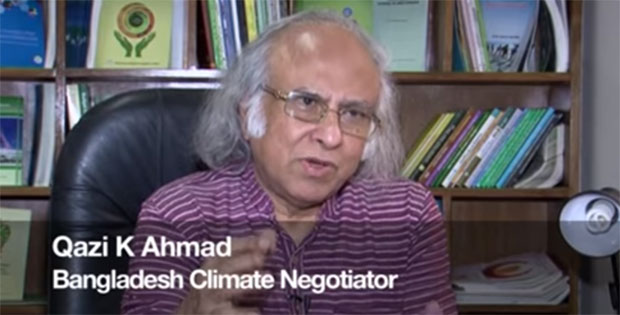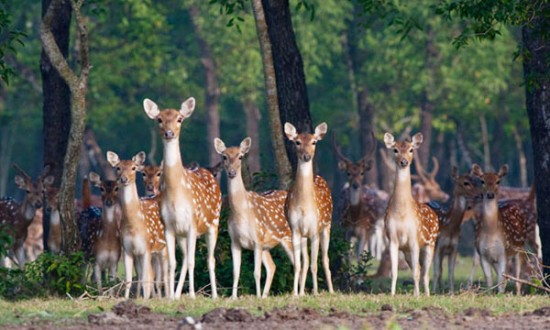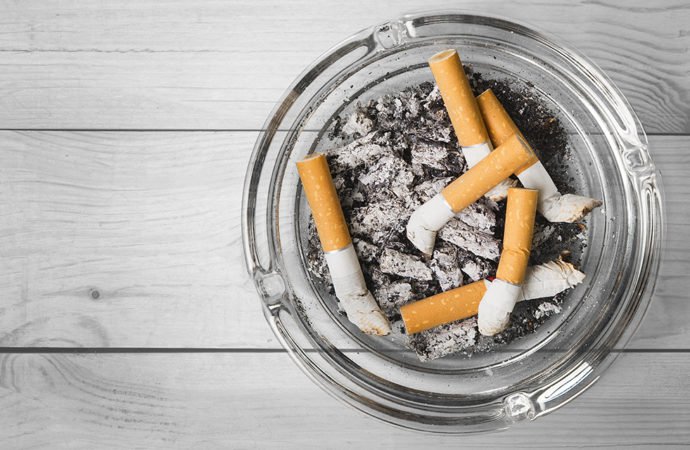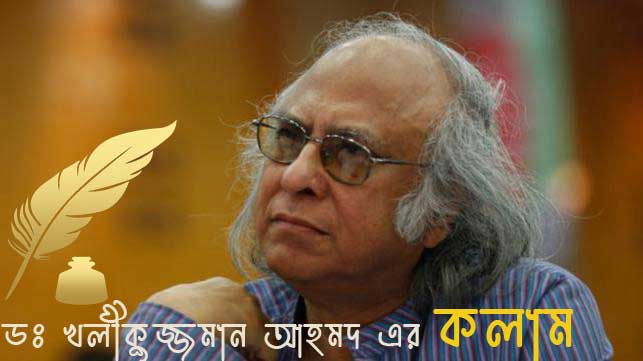
Title: ‘World leaders must come out from their narrow political interests to deliver the best deal at COP21’
Date: 14 Nov, 2015, Source: Dhaka Tribune
News From Newspaper (Interview By: Abu Bakar Siddique):
Bangladesh is a Deltaic country. Most of the areas of the country are only a few metres above sea level. It is located at the bottom of the three major rivers systems — the Ganges, the Meghna and the Brahmaputra — and has a long coastal area of about 700km. Its climate is temperate, wet and the rainy season is rather heavy.
The country has suffered a lot from impacts of climate change and the rising sea level will affect about one third of the country. Already, the salinity is induced about 100km above in some places. River bank erosion has also intensified due to the negative impacts of climate change in recent years.
The changing weather pattern is also a problem, for instance, the country experienced prolonged rainfall, which is unusual, and at the same time, some parts of the country faced droughts. Climate change induced displacement is increasing every year and creating pressure on urban areas ultimately creating a scarcity of different services, including education and healthcare.
Dhaka Tribune’s Abu Bakar Siddique talked with Qazi K Ahmad, the co-ordinator of Bangladesh Climate Change Negotiating Team to UNFCCC just ahead of COP21, to know Bangladesh’s plans and expectations from the climate summit.
Q: What is Bangladesh’s plan regarding carbon emission and what has the country projected in its Intended Nationally Determined Contribution (INDC)?
We have said that we will not increase our GHG emission more than the average of the developing countries. That is our commitment. Whatever the average emission will be for the developing countries, we will not exceed it, we remain below that. We are committed to being a part of the global process to reduce GHG emissions.
We emit very little, which is only 0.3 tons per capita per annum compared to developed countries. We are not responsible for climate change. Our plans obviously will increase some emissions as we need development and we need poverty reduction and that will result in some increases in emissions.
In certain sectors, we are reducing emissions. For example, we have already been implementing projects like solar power and biogas. Natural gas is being used for producing electricity, which is not emitting that much. We are also negotiating with Bhutan and Nepal for hydropower.
Regarding adaptation, we are expecting the adaption support, as our economy is comparatively weaker than others. Over the last six years, Bangladesh has spent $385m from its own budget, mostly towards adaptation, but it is a very small amount compared to what is needed. Therefore, we need support, both technologically and financially, to be able to implement adaptation and mitigation projects more meaningfully.
Q: Do you think the issue of “loss and damage” will be discussed in COP21?
Loss and damage will be discussed later on. It is a contentious issue. The EU and others are not interested in it. There is also a definitional problem, either it will be assessed after adaptation or before adaptation. If we focus too much on loss and damage we might neglect adaptation. At the same time, we want to see that “loss and damage” is compensated for. So this is not an easy thing to do. My main emphasis is on adaptation. Therefore, I would like to focus on adaption and emphasise loss and damage later and for that we can further negotiate.
Q: Regarding finance, Green Climate Fund (GCF) is yet to get any confirmed source of money. Now we are seeing the developed countries are trying to merge climate finance with Official Development Assistance (ODA). What do you think?
ODA has been around for a long time. Developed countries had promised in the last 50-60 years that they will provide 0.7 % of their GNI to the developing countries in ODA, but only half of that has materialised till now. Only some countries, especially the Scandinavian countries, are at the forefront of keeping their promise.
There is a general agreement that climate finance has to be an addition to ODA and it has to be grants. These are the principles of climate finance.
It means that the fund will come from developed countries for the developing countries to take climate action. There are several funds already in existence — the Adaptation Fund, Least Developed Countries Fund, and Special Climate Change Fund.
These funds have not much money in them anymore. The Green Climate Fund (GCF), fully operational now, has been established and there is a discussion now that the other funds are not necessary and that everything should come to the GCF. But I would argue that those funds should remain, as one particular fund will not serve all countries and all issues.
GCF is a fund without much money yet. Only $10.4bn has been committed and about one third of it has already been provided. Climate change funding has to be predictable and has to be a grant.
There is discussion that part of the climate fund has to be loan and half of the fund will be borne by the country itself. For example, if Bangladesh wants $2m for a project, half of the money would be provided by the country and the other half will be borne by GCF, which is not acceptable.
In addition, we don’t see enough commitment from developed countries to GCF, though there is a commitment that $100bn will be provided starting from 2020 every year. Moreover, there is discussion on involving the private sector in climate funding. But I don’t believe the private sector will come at adaption, rather they will come to mitigation sectors like energy and others.
Q: What are you expecting from COP21?
We are still negotiating on the basis of 12 points, which are taken in Copenhagen. For example, the warming at 1.5C or less than 2C is introduced there. The most vulnerable countries will be given preference for adaptation funding. We are expecting a legally binding agreement. This year, the hope is very high that we will get an agreement. The earth’s climate has been behaving very abnormally in recent times. Both developed and developing countries face the same fate. Developed countries have the capacity to manage them but the developing countries do not. Countries like Bangladesh have limited capacity, therefore we cannot manage properly for lack of resources. Developed countries will be unable to manage in the future unless we reduce the global warming drastically. I hope the leaders of the world will realise this and act accordingly and come out from their narrow political interest and think globally and come to an agreement.
Q: What will be the stance of the LDC group in COP21?
Bangladesh is still an LDC, although its average income has increased to a level of lower-middle income. Therefore, we are still negotiating within the framework of LDCs as well as with G77.
We belong to various groups. Where the interest lies, we find out those interests and work with other countries. It’s not a matter of one country; it’s a collective process. You can’t say only Bangladesh has achieved after a negotiation. It’s a group basis.
Q: Do you find any disparity in the UNFCCC negotiations?
Developed countries often made commitments which are not fulfilled similar to ODA. In global negotiations, the weaker countries usually don’t get what they want. But of course, we have to continue, co-operate and collaborate and work together to utilise the points of advantages of all countries.
I am not optimistic that we will get a legally binding treaty from Pairs, but I hope that I am proven wrong. If we fail to reach to an agreement in Paris, the world is on a course to be warmed by 6C, the world will be unlivable. That’s why I believe that world leaders will come to an understanding.
Q: What do you expect in Cop 21 for climate induced displaced people?
In the Cancun agreement there is a clause, that the climate induced displaced people will be rehabilitated within the countries, within the regions or internationally.
This decision has not been taken further. We are trying to get this on the agenda at COP21, though this is very difficult. Even in the Sustainable Development Goals (SDG) we did not make it a goal, rather a target. Therefore, we will try to push the issue so that we can find a solution for this problem.
Abu Bakar Siddique is the environment reporter of Dhaka Tribune. This interview is one of a series commissioned by the International Institute for Environment and Development (IIED) on behalf of the Least Developed Countries Independent Expert Group ahead of the UNFCCC climate summit in Paris (COP21)
Interview By: Abu Bakar Siddique
Link Source: http://www.dhakatribune.com/feature/2015/nov/14/world-leaders-must-come-out-their-narrow-political-interests-deliver-best-deal-c



